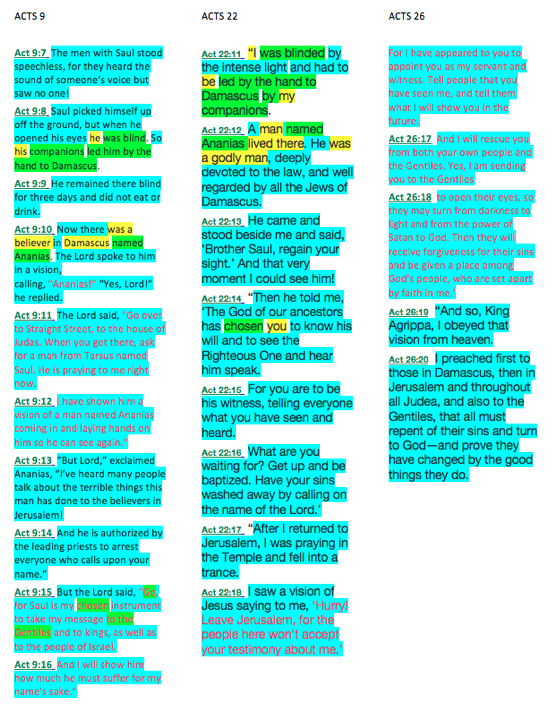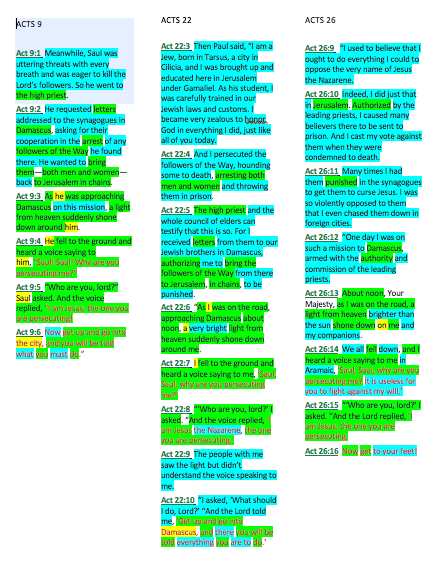

Key:
Green – shared word for word
Yellow – approximate or stylistic
Blue – unique
There are still some questions left hanging it seems. A number of you have picked up on one or more of the unanswered questions.
Ross has been the one to consistently send in the questions so let me pick up on his phrasing of two of the issues:
Is it poetic license where in one verse says the men stood speechless (9:7) and in another we all fell down? (26:14) Ross
Ian just what is it that happened to Paul’s companions on the Damascus Road? Seemingly they fell down (26:14) but they while they heard the sound of someone’s voice they saw no-one (9:7). I can’t quite harmonize all the details related to this. Can you help clarify it for me. Bruce
In order to limit the answers to these questions to just one Gem I will try to deal with them succinctly and without great detail. I hope that is successful.
It does seem to be a little confusing when you take the role of a detective and investigate Paul’s account. How is that Jesus appeared shining brighter than the sun and yet the others didn’t see Him but only heard his voice. How is that possible? And furthermore let me add my own new question: If they didn’t see the bright light what was it that made them fall?
I have thought a number of times when I have read through Acts, I would have liked it if Luke had interviewed Paul’s companions on this occasion. I feel like we haven’t got the full story. I can accept the fact that Paul was blinded after seeing Christ but they saw nothing. This was an encounter with the LORD of all Glory after all. It seems Jesus kept the others from seeing Him – it was not their revelation. I have no problem with that. That makes sense to me. I find it interesting that they heard the sound of someone’s voice. i.e. someone else’s voice. It was not just Paul talking to himself. But they saw no-one. That lends credibility to the facts of the encounter but still leaves me with questions. For a number of years I have just wrongly assumed that Paul’s companions fell because they were confronted with the light. But it is clear that they saw nothing. If therefore they saw nothing then what made them fall? That question has come to me after comparing the accounts in detail as I have this time. At this stage I don’t have any smart answers for this question. And like Ross asked above: Is it poetic license where in one verse says the men stood speechless (9:7) and in another we all fell down (26:14)?
I could understand how the men could have had both reactions but just how and in what sequence did they fit together? Luke hasn’t told us. I will ask either Paul or Luke or even the men themselves if I know who they are when I get to heaven. That portion remains a mystery to me. But I can hold that in tension.
Now let me address the second of Ross’ questions – well actually a collection of them.
The good news that Paul preached did not come from man but “ it came to me through revelation of Jesus Christ”. (Gal 1:11-12)
Where Ian did He give him that revelation, was it in Arabia, or maybe when he went back to Damascus? (Gal 1:17-18)
Why is this part of his life not known, why did he not tell us, would you like to venture an opinion?
I am thinking about this because so much is missing. Is Arabia a spiritual retreat into the desert, did he use the time to perfect his message to the Gentiles. Moses, Elijah, John the Baptist and even Jesus spent time in the desert.
It seems from my Gem on Jesus Briefing to Paul it sparked these questions in Ross. I have noticed for the first time in doing this comparative analytical study of the accounts that there were actually few details of what Jesus told Paul outside of the bare bones. Which inspired me to call it a ‘brief”. That seems to have sparked in Ross (correct me if I am wrong Ross) that thought – so where did Paul get the details of the Gospel from in the light of the statement in Gal 1:11-12? When?
I think that what Paul needed was a new paradigm to give him the parameters for looking at God’s message to Israel in a new way. He had all of the basics from his training as a rabbi. What was required now was to put the old teachings through a new paradigm. I am sure Paul’s encounter with Christ on the Damascus Road was the impetus to the shock that he hadn’t got the message of God to Israel correct despite training under Gamaliel. The wrong slant was one that all Jewish rabbis had assimilated, not just Paul. This One that most of the leaders had rejected as Messiah was now standing before Paul in a ball of light. How reminiscent that was of Moses experience on the mountain. Paul couldn’t have escaped seeing that, blind and all as he was at the time.
I personally think that the revelation he gained when he encountered Christ on the road came in a blinding flash, in a nano-second. Then Paul had to spend time unpacking it. I know about that experience personally. What I am currently working on with Deeper Bible is a case of putting the details on revelation that God has given me in moments of time like the encounter with the Lord in bed in the wee small hours last week. The idea for Deeper Bible came in a short space of time years ago and then has required fleshing out and fine tuning along the way while maintaining the overall consistency of the message of the Bible. I would say in answer to Ross’ question on this matter that Paul must have faced that too, only on a scale vastly higher and deeper and wider than I.
Yes Ross, I suspect that Paul honed his thinking and maybe even Jesus fine-tuned it in the desert in Arabia but we have not been told anything more about the experience and so must not speculate. But I do like you connecting this experience with other Bible men who had desert experiences. Like you I would love to know more about Jesus’ early childhood. Details Luke, give me the details. But either he or God has chosen not to.
So we must be content with that. It doesn’t stop people like you and I asking our questions though. Some answers are there in the text for us; others are not so we have to be careful not to manufacture our own content when God plainly hasn’t told us all of the answers. That’s the difference between exegesis (rightly interpreting from the Scriptures what has been written in there) and eisegesis (wrong reading into the Scriptures our own interpretation). Let’s err on the side of caution, hold our questions and ask them to those concerned when we see them – and we will. But I think we will be too caught up in worshipping Jesus to even remember the questions we had.
Study to show yourself approved by God, a workman who need not to be ashamed, rightly dividing the word of truth. (Paul of Tarsus )
1 Tim 2:15
If you think education is expensive, try ignorance.
Mark Twain
Sometimes I think I understand everything, and then I regain consciousness.
Anon
God only gives us what we can handle, but sometimes I wish He didn’t trust me so much!
Anon
People laugh because I am different. I laugh because they all are the same.
Ian Vail

